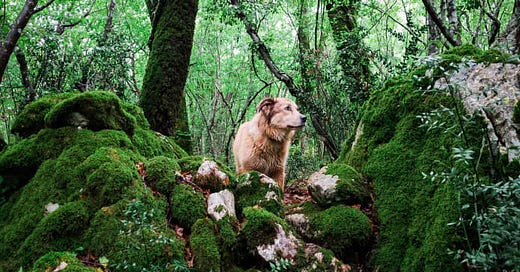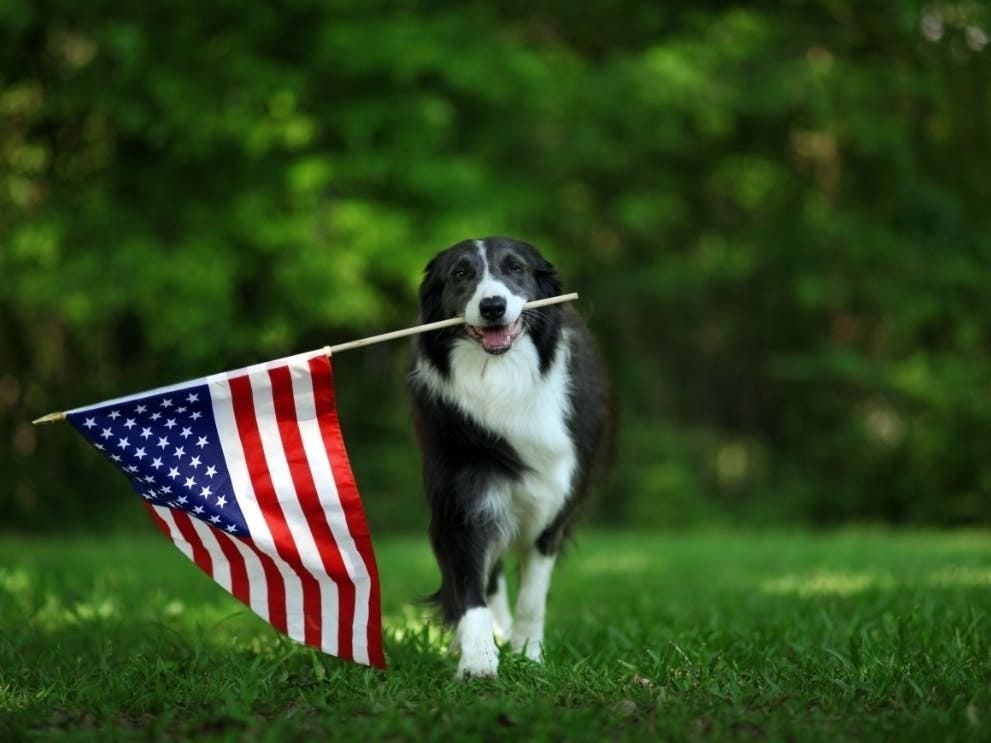1. Very few people attempt to walk around the entire world, and even fewer actually manage to complete the journey. On May 21, 2022 Tom Turcich, from New Jersey, became the 10th person on record to achieve this remarkable feat, while his four-legged companion Savannah was the first dog to do so. The pair were greeted with a huge homecoming celebration attended by many of Turcich's friends and family, along with well wishers. The triumphant moment brought about the end of a seven-year, 48,000-kilometer (29,826-mile) journey that he'd spent even longer working toward. (via CNN)
2. A tennis club’s idea to train dogs to retrieve tennis balls at Wimbledon did not go according to plan when the dogs failed to do the one thing they needed to: return the balls. Wilton Tennis Club in London, along with insurance company ManyPets, tested replacing ball boys and girls with dogs. They tested the dogs’ speed, agility, ability to jump over the net and, most importantly, retrieval. Apparently, the dogs were fast to chase the balls, but not so eager to return them to the players. “Our players did find themselves in a game of tug-of-war,” club coordinator Martin Schiller said. Though the trial did not go exactly according to plan, ManyPets is still calling on Wimbledon to use their “ball dogs” at next year’s tournament. (via Deseret News, Daily Star)
3. While it is clear that grey wolves gave rise to dogs, there is no consensus regarding when, where and how this happened. Skeletal remains attributable to the present-day dog lineage appear archaeologically by 14 ka and genetic estimates of when the ancestors of dogs and modern wolves diverged range from 40–14 ka. However, genetic data from modern and ancient dogs coupled with modern wolves, to which previous studies were largely restricted, may not be able to resolve the origin of dogs. Genetic diversity within dogs is affected by their dynamic history and is unable to confidently pinpoint an origin. (via Nature)
4. Chronic wasting disease has been detected in just one white-tailed deer on the Blackfeet reservation, but once it's present, it's impossible to eradicate, according to wildlife managers. That's where the dogs come in. Calling Last received a $75,000 federal grant to run a yearlong study to train dogs to sniff out chronic wasting disease and toxic waste that might otherwise be ingested by people who hunt wild game and gather traditional plants. The project aims to protect tribal members' health by letting them know where the disease has been detected and where toxic waste has been found in order to preserve safe spaces to conduct traditional practices. (via NPR WNYC)
5. Jeanine Nesvik came home from work one evening to a sickening discovery: Somebody had broken into her home outside Phoenix and had stolen her four dogs, along with seven rescued dogs she was fostering in her house. Nothing else inside the house was taken, but to Nesvik, nothing else mattered. Nesvik shared the news with friends and fellow dog lovers in her community of Chandler, Ariz., asking them to keep an eye out for her pooches. The community immediately rallied. “It was shocking that something like this could happen, and everyone was thinking, ‘What if those were my dogs?’ ” said Debbie Varner, founder of Follow Your Heart Animal Rescue in Chandler. (via The Washington Post)
6. Enjoying a sunny day on the sand, you see a beachgoer walking a dog off leash—despite signs stating that dogs must be leashed to protect nesting birds. Do you speak up? Or mind your business? “There’s many things a person can do, depending on their comfort level,” says John MacDonald, a corporal at the Maine Department of Inland Fisheries and Wildlife, which handles dozens of cases involving humans, dogs, and shorebirds every year. Since game wardens can’t patrol beaches 24/7, he encourages birders to share their knowledge of the beach’s regulations and the sensitive birds nesting there. If you go this route, tone is important. The dog walker may be genuinely unfamiliar with a beach’s leash policy. (via Audubon)
7. The Canadian Food Inspection Agency (CFIA) has announced that it is banning “commercial dogs” from over 100 countries from entering the True North. On Tuesday, the CFIA said this measure will kick in on World Rabies Day — September 28 — this year, but all import permits issued on or after June 28 will expire on September 27. “Commercial dogs can include, but are not limited to dogs for resale, adoption, fostering, breeding, show or exhibition, research, and other purposes,” the agency clarified. This definition includes rescue dogs. The move is aimed at protecting Canadians and their pets from the risk of dog rabies. Animal rights activists and rescue shelter workers are concerned about how this will affect vulnerable dogs in countries with high-kill shelters and dog-culling practices. (via Daily Hive News)
8. In the last two years there have been some 6,800 dog attacks across 13 Council areas in Queensland, Australia with more than 415 dog attacks across the Sunshine Coast and Noosa in the past 12 months. The victims of dog attacks often carry lifelong physical and psychological scars. It would be reasonable to believe that if a dog attacks, that the legal position would be clear and that the person with the control of the dog would be strictly liable for the injury and loss suffered from the attack. That is the position in Australia – except in Queensland. There is legislation in every other Australian state and territory which provides that persons with responsibility for dogs are strictly liable for the consequences of their attacks and for the damage and loss arising from the injuries suffered in the attack. (via Mondaq)
Bonus: More pets reportedly go missing on the Fourth of July than on any other day of the year. The booming sounds of fireworks can cause pets to become disoriented, and can elicit fear and anxiety in them. This is the case especially with dogs due to their heightened sense of hearing. Here are some tips from American Veterinary Medical Association to keep your pets safe come Monday:
Ensure your dog gets plenty of exercise during the day before the fireworks begin.
Provide a safe space for them to retreat like their crate or bed and check on them every few hours.
Make sure your dog has a collar and ID tag, and make sure their GPS tracker is fully charged.
Keep your pets indoors, lower blinds and close windows so they won’t be frightened by the noise and bright lights.
Put on music to mask the sound of fireworks.
After the celebrations, AVMA also recommends you check your yard for any fireworks debris before allowing pets outside to play or relax. Many fireworks contain toxic substances, including potassium nitrate, arsenic, and other heavy metals. (via Daybreak Natucket, American Kennel Club, American Veterinary Medical Association)
Dog Photo of the Week
Photo by Sophie Gamand, “Portraits Highlight Survivors of Dog Meat Trade” (via Treehugger)
Dog Video of the Week
By The Today Show, “ ‘World’s Ugliest Dog’ Mr. Happy Stops by TODAY”.
ps! Wishing you a happy 4th of July, (hot)dogs and all!





